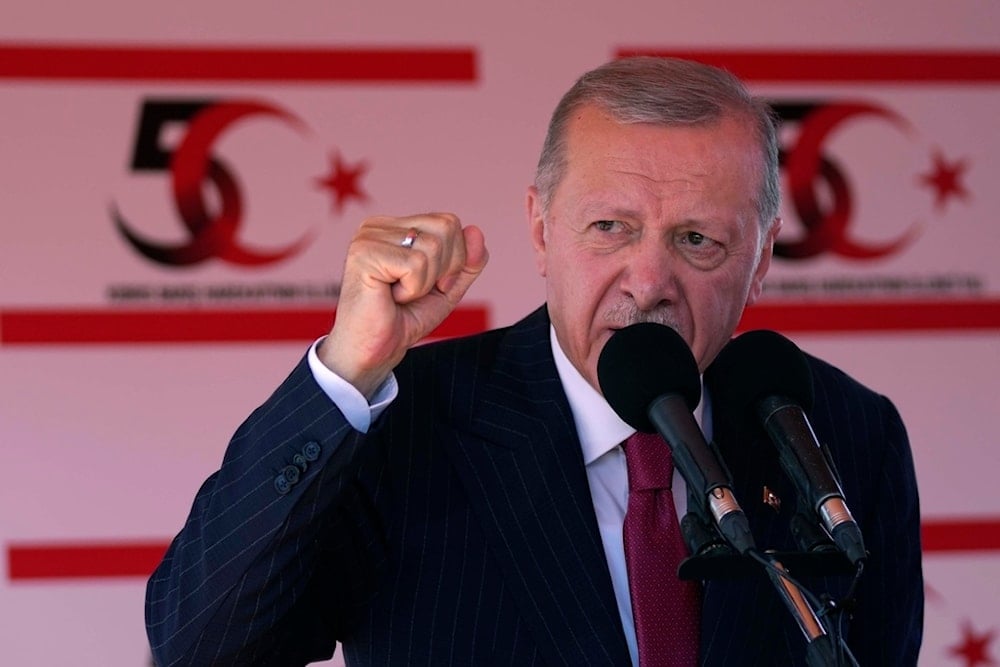'Israel' must be punished to deter others from 'such cruelty': Erdogan
The Turkish President calls on the United States to put pressure on "Israel" and withdraw its support for "murderer" Prime Minister Benjamin Netanyahu.
-

Turkish President Recep Tayyip Erdogan talks during a military parade, in the Turkish part of the divided capital Nicosia, Cyprus, Saturday, July 20, 2024. (AP)
"Israel" must face severe punishment for its actions to prevent anyone from contemplating such cruelty again, Turkish President Recep Tayyip Erdogan stressed on Sunday, referring to the ongoing Israeli war on the Gaza Strip.
"Israel must face the consequences of its actions, ensuring that the punishment serves as a stark deterrent against anyone considering such cruelty again," Erdogan told reporters on his return flight from the breakaway state of northern Cyprus, also known by Turkey as the Turkish Republic of Northern Cyprus (TRNC).
The Turkish leader touched on an advisory opinion from the International Court of Justice (ICJ), which affirmed Palestinians' right to self-determination and ruled that Israeli settlements in occupied territories must be evacuated.
"I hope this decision and previous ones not implemented by Israel will bring an awakening in the international community," he expressed.
Erdogan also called on the United States to put pressure on "Israel" and withdraw its support for "murderer" Israeli Prime Minister Benjamin Netanyahu and his associates to end the oppression in the Gaza Strip.
"To end this oppression, it is necessary for the US administration to pressure Israel and withdraw its support from murderer Netanyahu and his associates," he stressed.
The ICJ said on Friday that it "has found... that Israel's continued presence in the Palestinian Territories is illegal."
ICJ presiding judge Nawaf Salam indicated that "Israel" is "under the obligation to bring to an end its unlawful presence as rapidly as possible."
The court added that "Israel" was "under an obligation to cease immediately all new settlement activities and to evacuate all settlers" from occupied land.
On northern Cyprus
In a separate context, Erdogan said on Sunday that his country does not see any new negotiation process starting on the Cyprus issue without both sides on the island engaging "as equals".
Cyprus has been ethnically divided, with Greek and Turkish Cypriots living on opposite sides of a UN-patrolled border.
Cyprus gained independence from Britain in 1960, but a shared administration between Greek and Turkish Cypriots quickly broke down, leading to violence that saw Turkish Cypriots withdraw into enclaves and prompted the dispatch of a UN peacekeeping force.
In 1974, Turkey captured more than a third of the island, displacing over 160,000 Greek Cypriots to the south.
In 2004, Greek Cypriots in the internationally recognized south overwhelmingly rejected a UN-backed reunification plan in a referendum.
Peace talks have stalled, with the last round of negotiations in Crans-Montana, Switzerland, collapsing in 2017.
"Frankly, we don’t see the possibility of starting a new negotiation process in Cyprus without establishing an equation where both sides sit at the table as equals and leave as equals," Erdogan told reporters.
Responding to recent remarks by Greek Defense Minister Nikos Dendias, who called Turks "occupiers", Erdogan described the comment as "impudent" and urged Greek Prime Minister Kyriakos Mitsotakis to reprimand Dendias.
The Turkish leader warned against actions escalating tensions in Cyprus, pointing out that "complicity in massacres in Israel would serve neither Greek Cypriots nor Greece."
In June, Hezbollah Secretary-General Sayyed Nasrallah warned the Cypriot government about allowing its airports and bases to be used by the Israeli occupation.
"The Cypriot government should be warned that opening its airports and bases to the enemy to target Lebanon means it has become part of the war," Sayyed Nasrallah stressed at the time.
Elsewhere, Erdogan noted that Turkey would not hesitate to establish naval bases or other maritime structures in Northern Cyprus "if necessary".
Read more: Cyprus, after Nasrallah's threat: We will not participate in any war

 4 Min Read
4 Min Read








